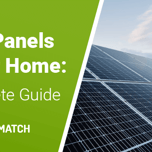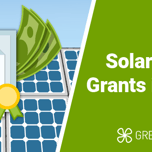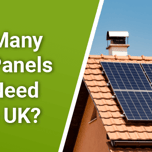Answer these simple questions and we will find you the BEST prices
Which type of solar quotes do you need?
It only takes 30 seconds
100% free with no obligation

Get up to 4 quotes by filling in only 1 quick form

Slash your energy bills by installing solar panels

For the average 2-3 bedroom house
- GreenMatch
- Solar Energy
- Solar Panels
- Flexible Solar Panels
Flexible Solar Panels in the UK (October 2025 Guide)


Due to higher demand for solar energy, solar panels are under constant development. Consequently, new technologies for making solar cells are being discovered. Not only do these developments increase the likelihood of solar panel prices going down, but they also add further benefits to solar panels, such as higher efficiency and the use of organic materials. Flexible solar panels are one example of this.
In this article, we'll talk you through what exactly flexible solar panels are, their cost, pros and cons, and more.
When considering installing solar panels, we highly recommend talking to a qualified installer about your options and seeing what works best for you. Actually - we advise you contact multiple installers. Why? Because this way, you can compare their prices and ensure you're getting the best deal.
Our team at GreenMatch can help get you started by connecting you with up to 3 qualified installers in your area whose quotes you can compare. Our service is completely free and non-binding. Simply click the button below to begin.
- Quotes from local engineers
- Payment by finance available
- Save up to £1,567 per year
It only takes 30 seconds



- What Are Flexible Solar Panels?
- When Are Flexible Solar Panels the Most Useful?
- Costs and Savings of Flexible Solar Panels
- Different Types of Solar Panels
- Advantages of Flexible Solar Panels
- Disadvantages of Flexible Solar Panels
- Things to Consider Before Investing in Flexible Solar Panels
- Find the Best Suppliers of Flexible Solar Panels in the UK
What Are Flexible Solar Panels?
Flexible solar panels are a type of solar panels which is made up of ultra-thin silicon wafers that are designed to convert sunlight into electricity. Although there is a wide range of different solar panel types, flexible solar panels are becoming more and more popular.
Unlike the conventional solar panels, flexible solar panels are made by layering one or more thin films of photovoltaic (PV) material on an underlying layer of plastic, glass, or metal. As a result, the solar panel becomes much thinner than conventional solar panels, making them flexible and lightweight.
When Are Flexible Solar Panels the Most Useful?
Flexible solar panels are the best choice for you if you are looking for a portable solar panel which can be moved, stored, and reinstalled, or if your home can not bear the weight of the traditional, permanently installed solar panels. Additionally, if you want solar panels for industrial or commercial applications, these flexible, thin-film panels are the better choice.
Flexible solar panels are also a great choice if you are looking for a solar panel which is aesthetically more pleasing than traditional solar cells. The fact that their performance is not affected by cloudy weather or high temperatures as much as other solar panel types' performance is also important to take into consideration.
Nonetheless, if you are looking for a solar PV installation for your home, traditional solar panels might be the better option. Keep in mind that choosing the right solar panel for you depends entirely on your personal needs and preferences, your budget, and how you intend to use the panels.
Costs and Savings of Flexible Solar Panels
As you can see in the table below, flexible solar panel costs are relatively low compared to the other types of solar panels. This is thanks to the faster and cheaper production process. Keep in mind that the installation cost of solar panels varies depending on the size and the type of flexible solar panel system.
| Roof Size | Number of Panels | Panel Performance | Total Performance | Total Costs | Total Savings Per Year |
|---|---|---|---|---|---|
| Small 10 m2 | 20 | 100 W | 2 kW | £2,000-£5,000 | £210-£270 |
| 13 | 150 W | 2 kW | £2,000-£6,500 | £210-£270 | |
| 10 | 175 W | 1,8 kW | £1,300-£6,000 | £189-£243 | |
| Medium 20 m2 | 40 | 100 W | 4 kW | £4,000-£10,000 | £420-£540 |
| 25 | 150 W | 4 kW | £3,750-£12,500 | £420-£540 | |
| 20 | 175 W | 3,5 kW | £2,600-£12,000 | £368-£473 | |
| Large 30 m2 | 60 | 100 W | 6 kW | £6,000-£15,000 | £630-£810 |
| 38 | 150 W | 6 kW | £5,700-£19,000 | £630-£810 | |
| 30 | 175 W | 5,2 kW | £3,900-£18,000 | £546-£702 |
The price of flexible solar panels can vary based on the quality of the material used for the panel as well as its efficiency rate. Especially panels which generate up to 175 watts have a larger price range.
To illustrate this: the cheapest panel has an efficiency rate of only 13%, whereas the most expensive one has an efficiency rate of 21%. Hence, both the savings and the costs of flexible solar panels strongly depend on the specific properties of the panel.
As you can see, the prices of solar panels can vary. That's why it's crucial to check the rates of multiple installers to avoid overspending.
Click the button below to get up to 3 free quotes from qualified installers near you and have your new solar panels installed quickly.
- Quotes from local engineers
- Payment by finance available
- Save up to £1,567 per year
It only takes 30 seconds



Different Types of Solar Panels
There are many different types of solar panels for different needs and purposes. A significant factor for choosing a type of solar panel is the location itself.
The most common solar panels used for conventional surroundings are the traditional types which are made of monocrystalline silicon or polysilicon. On the contrary, flexible solar panels can be found under the thin-film solar panel type.
Monocrystalline Solar Panels
A monocrystalline solar panel is made of the purest solar cells. Thanks to the pure silicon, this type of solar panel has one of the highest efficiency rates. The monocrystalline solar panels have several advantages.
Compared to the polycrystalline solar panels, the monocrystalline solar panels last longer, occupy less space, and are less likely to be affected by high temperatures. However, these advantages also come with the highest costs.
Polycrystalline Solar Panels
The polycrystalline solar cells are made of raw silicon. In contrast to the pure silicon of the monocrystalline solar panels, this silicon is melted in a faster and cheaper process.
On the one hand, thanks to the different silicon material and the cheaper production process, the polycrystalline solar panels are offered at a lower price rate. On the other hand, these solar panels are less efficient, take up more space, and have a shorter lifespan than monocrystalline solar panels.
Yet, besides their costs and efficiency, the differences between the mono- and polycrystalline solar panels are not very remarkable, since their power outputs are very similar.
Thin-Film Solar Panels
Flexible solar panels should not be confused with thin-film solar panels. There are three types of thin-film solar panels, all made from different materials. Flexible solar panels are a specific type of thin-film solar panels made from silicon.
Thin-film solar cells are the least expensive option compared to the two mentioned above. This type of solar panels is the easiest to produce. Aside from that, they require a smaller amount of materials for their production process, leading to cheaper prices.
Due to their flexibility and low affection of high temperatures, thin-film solar panels open up for many different alternatives. However, their lifespan is relatively short and they are likely to take up a lot of space.
Advantages of Flexible Solar Panels
There are many reasons why one should consider choosing a flexible solar system. We have listed the main advantages of flexible solar panels below.
The greatest advantage of flexible solar panels is their ability to adapt to many different kinds of solar projects. For example, flexible solar panels can be bent and shaped in a way that they fit the surface they are installed on.
Moreover, they are often referred to as lightweight solar panels as they tend to weigh less than traditional solar panels. Therefore, thin-film solar panels are a great solution for roofs that can’t bear the heavy weight of traditional systems.
Another advantage of flexible solar panels is their portability. This means that the cells can be installed temporarily and can, later on, be stored or installed in a different location. Additionally, if you are looking for caravan solar panels, solar panels for campervans, or solar panels for RVs, flexible solar panels are the best option.
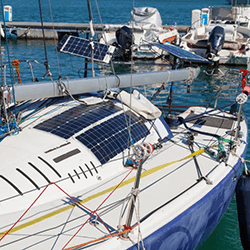
A huge advantage that researchers are currently working on is the implementation of organic photovoltaic material. They have developed a record-breaking flexible solar cell, moving from a 9.7% to a 12.25% conversion efficiency.
Furthermore, flexible solar panels can be semi-transparent, enabling them for implementation on glass surfaces. This means that they can even be used to create windows that generate solar power!
Contrary to traditional solar panels, thin-film solar cells react less severely to changes in temperature and are less sensitive to changes in lighting conditions. Therefore, they can minimise the energy loss on cloudy days.
Consequently, just like solar powered blinds, flexible solar cells can be installed on areas that do not face south directly. The flexible solar panels are thus able to generate energy from flat roofs and on very large solar photovoltaic systems.
An additional advantage of flexible solar cells is their durable material which can withstand, for example, heavy weather conditions.
Finally, as mentioned above, the flexible solar panels are typically cheaper to install than the traditional solar panels and are, therefore, available at lower purchasing price.
Disadvantages of Flexible Solar Panels
Nonetheless, each solar system has its disadvantages. In order for you to make the right decision, we have listed a few disadvantages of flexible solar panels below.
Flexible solar cells in the UK are mainly criticised for not being as efficient as the more expensive versions — especially when comparing them to traditional solar panels.
Nevertheless, thanks to the constant development of solar energy, researchers discover more and more ways to implement organic solar cells, setting remarkable energy records.
A barrier to various solar projects can be the limited roof space which is available for the installation of solar cells. Due to their thin layers, flexible solar panels need relatively more space to generate the same amount of energy as their traditional counterparts.
This may be a disadvantage for the installation of flexible solar panels on residential roofs. On the contrary, flexible solar panels are best for smaller solar projects which don’t require large amounts of energy to be generated, such as installations on RVs or boats.
Finally, despite their durable material, flexible solar have a shorter lifespan and are more vulnerable to long-term environmental impacts than traditional solar cells.
Things to Consider Before Investing in Flexible Solar Panels
As mentioned above, it is important to keep in mind that your choice of solar panels should be based on your personal preferences, your budget, and your intentions with the solar panels. Take a moment to reflect upon your own preferences and how you plan to use your solar energy.
Another confusing factor in the process of choosing the right solution for you is the flexible solar panel efficiency rates. There are several things which determine how efficient solar panels are.
It is important to keep in mind the factors that are the most relevant in your specific situation when choosing a type of solar panel. While traditional solar panels have higher efficiency rates, more efficient solar panels are not necessarily better!
Perhaps you are interested in flexible solar panels for your motorhome or would like to have a specific style and aesthetics. In that case, despite the lower efficiency, flexible solar panels would be the best choice for you.
Find the Best Suppliers of Flexible Solar Panels in the UK
Investing in flexible solar panels for your home is not an easy decision. It is important to keep in mind that there are several factors that influence the performance of the solar panel system.
Flexible solar panels are available at different price ranges based on their efficiency rate and build quality. Even though the flexible solar panel costs may seem slightly high at first, it is definitely worth your consideration, as you will be able to reduce your electricity bills in the long run.
Are you interested in hearing more about flexible solar panels? Click the button below and we will provide you with up to 3 personalised quotes from our partner suppliers. Our free service will help you find the right flexible solar panels for you without any obligations.
- Quotes from local engineers
- Payment by finance available
- Save up to £1,567 per year
It only takes 30 seconds




Aris Vourvoulias was the Head of Content in GreenMatch. Aris is a passionate author and marketer with an educational background in journalism. He continuously writes, reviews, and educates himself in the areas of business, finance, and renewable energy. He has managerial experience in many European markets, including UK, Denmark, Sweden, and Finland. He and his content team have been featured on reputable sites like GreenPeace, Guardian, iNews, Gizmodo, and more

We strive to connect our customers with the right product and supplier. Would you like to be part of GreenMatch?

- Flexible Solar Panels
- What Are Flexible Solar Panels?
- When Are Flexible Solar Panels the Most Useful?
- Costs and Savings of Flexible Solar Panels
- Different Types of Solar Panels
- Advantages of Flexible Solar Panels
- Disadvantages of Flexible Solar Panels
- Things to Consider Before Investing in Flexible Solar Panels
- Find the Best Suppliers of Flexible Solar Panels in the UK

